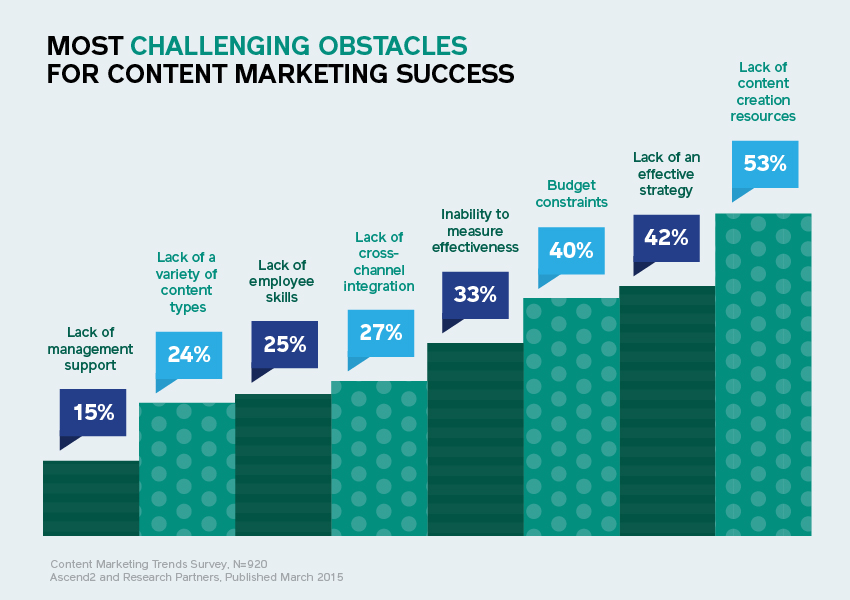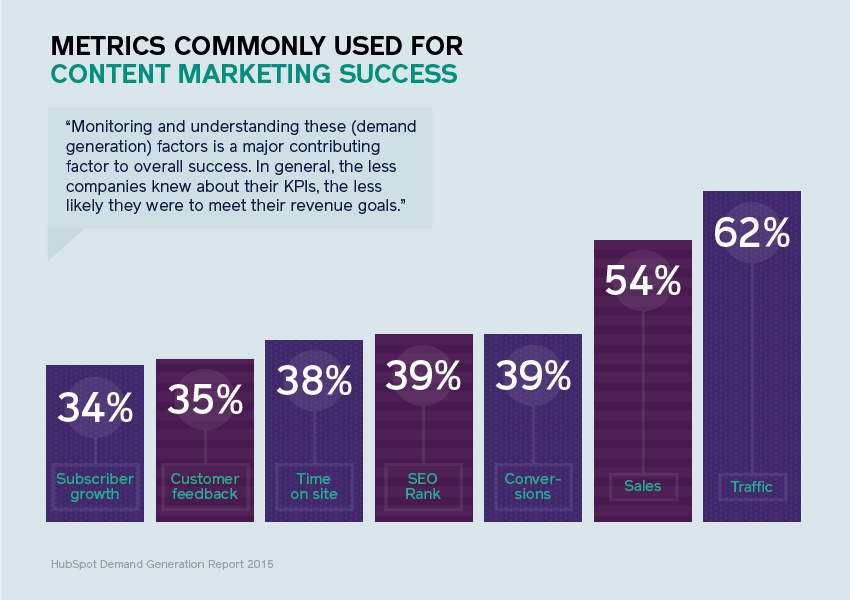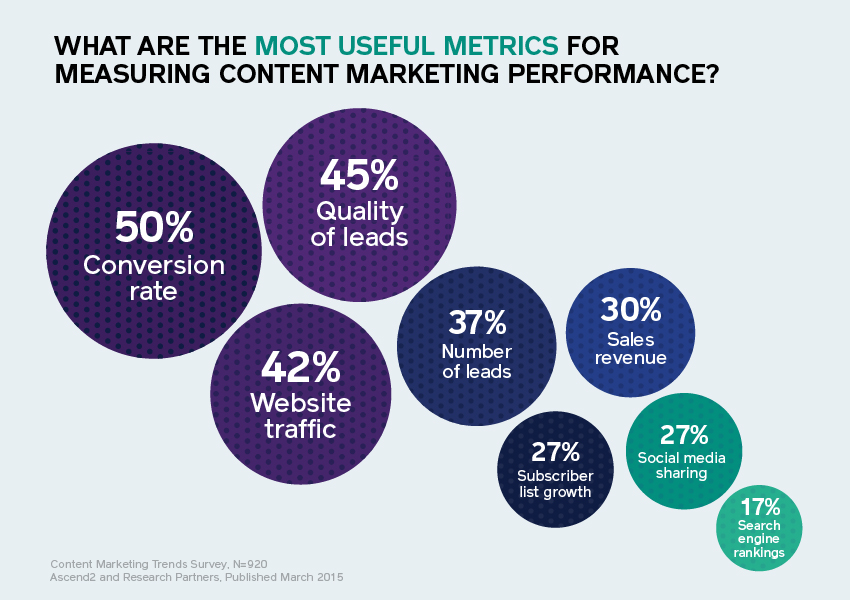Do You Have a Handle On Your Content Marketing KPIs?
Content marketing is an enigma. When it comes to doing it, almost every company on the web is clued-in. But when it comes to measuring it, most are clueless—and the majority is willing to admit it.
Let’s unravel this sucker.
Research reveals the majority of companies plan to continue increasing their content marketing budgets. Good, I guess. All the while, an unhealthy chunk gives themselves low marks for effectiveness.
38% of B2B and 37% of B2C marketers rate their use of content marketing as effective.
Source: 2015 reports by Content Marketing Institute & MarketingProfs
Not so good. However, the problem above probably pales in comparison to this next one:
Only 21% of B2B and 23% of B2C marketersindicate they are successful at tracking the ROI of their content marketing programs.
Source: 2015 reports by Content Marketing Institute & MarketingProfs
It’s interesting to note when asked to rank their top challenges, the answers provided by B2B and B2C marketers stack-up a bit different.
According the to same research, the top three challenges of B2B marketers are:
-
- Producing engaging content
- Producing consistently
- Measuring content effectiveness
The top three challenges of B2C marketers are:
-
- Measuring content effectiveness
- Producing engaging content
- Lack of budget.
Clearly, tracking the ROI of content marketing isn’t easy. It’s a point of pain for most.

Recent research from Ascend2 shows “inability to measure effectiveness” as the fourth most cited obstacle for content marketing success.
What to measure is a point of confusion too
So you want to take this challenge seriously. You want to measure the effectiveness of your content marketing programs.
You can take some comfort in knowing if most of your content is distributed digitally, it’s inherently measurable. Of course, you’d be lying if you said this makes it easy. You have to decide what to measure—and you have to learn how to interpret it.
Therein lies the bad news. Measuring online content marketing isn’t about keeping score of phone calls. It’s not about measuring coupon redemptions. Nor is it as simple as counting the return rate of tip-in cards or fax-backs (and you may be too young to even know what these things mean).
Nope. It’s a wilderness, of sorts. Thankfully, you have plenty of company and many companies in the field of marketing automation and tools are doing their best to lend a hand.
HubSpot points out the less you know about your key performance indicators, the less likely you are to meet your revenue goals. Their research shows 7 metrics marketers commonly use to measure content marketing success. Ranking high to low, they are:
- Traffic
- Sales
- Conversion
- SEO rank
- Time on site
- Customer feedback
- Subscriber growth
A little KPI primer for getting started
Smart marketers improve ROI with content marketing. The key is to establish objectives, benchmarks, and key performance indicators (KPIs).
Understand, content marketing takes time. You should see some metrics improve in short order (such as page views), but you need to allow for at least six months to a year to get a handle on meaningful metrics. Content marketing is not a campaign.
“Campaigns are a cost that provides value at a moment in time. Content marketing is an investment that, if done well, provides increasing value over time.”
~ Robert Rose, chief strategy officer, Content Marketing Institute
Marketers have always struggled to measure the success of their efforts in an accurate and meaningful way. The question, “How much money did our investment return” is perplexing. Why? One, it’s difficult to focus specifically on sales. Two, it’s difficult to attribute a specific asset—or even a program—to a sale.
Still, content analysis can and should be done. Companies that do it well document specific objectives, attach specific KPIs to each objective, regularly track the chosen indicators, and finally, use the data to take specific actions to refine their subsequent efforts.
The good news is basic analytics will enable you to measure a lot of different things. Following is a broad overview of content analytics organized into five categories content marketers often rely on.
Consumption metrics are mostly measured with Google Analytics. Metrics to help you to understand how your content is being consumed and the paths used to find content include:
- Traffic—total visits, unique visits, etc.
- Referral traffic—sources from around the web
- Page views
- Time-on-site
- Time-on-page
- Abandonment rate
- Downloads
Lead generation metrics
You need to define (1) what a lead is to your company and (2) conversion. Following are basic conversion measurement tactics:
- Form completion is a popular approach and can be tracked by setting up conversion goals in Google Analytics.
- Leads can be measured by tracking where a lead originated, which might be a specific piece of content such as a blog post or video.
- Measuring subscriptions, generally with opt-ins to email, is a common form of lead generation analytics.
Sharing metrics
Social media metrics don’t have a dollar value, but content marketers value them because they can generate referral traffic, conversions and build awareness.
Social media shares provide insight into how and if people share your content. By tracking sharing activity you can take the temperature of how your content is valued by readers and apply the insights to your content marketing strategies.
Retention metrics
Retention metrics reveal the degree to which you’re able to earn loyal consumers of your content. Measure website and blog retention with:
- New and returning visitors
- Bounce rate
- Social media follower counts
Sales metrics
The boss is going to want sales metrics, some form of simple data to indicate content marketing ROI.
To produce sales metrics you’ll need to integrate your marketing platform and CRM system because you want to track user behavior throughout the sales cycle. Armed with data that indicates the types of content paying customers consumed will enable you to assess which content influences sales the most.
You’ll create formulas that make sense for your sales cycle and may apply them to measure:
- An individual piece of content (e.g. a blog post, a webinar)
- A group of content assets (or “campaign,” if you like)
- A form of content (e.g. your blog, all webinars)
What metrics are most useful?
The answer is for you to decide.
When Ascend2 and its research partners probed marketers on the topic they found conversion rate, quality of leads, and website traffic ranked highest.
Select a few. Monitor them at regular intervals. Create a dashboard to record them. Examine it often. Allow your KPIs to inform changes you’ll make to your strategy and execution.
Repeat. Refine. Keep at it.
Measuring content effectiveness isn’t easy. But that’s no excuse for not doing it.
Your content marketing KPIs are clues to what is and isn’t effective. So clue-in.
Credits:
- This post was originally written for studioD.com, published as How Do You Measure Content Marketing Effectiveness?
- studioD created all the very cool graphics here
- Their services empower you to be a publishing hero.














Comments
Gary Sund
You Rock Barry.
Always worth the read.
Barry Feldman
Thank you Gary.
Alethea
This is a great article. Content metrics is one of those things that’s always on my mind. But this article has given me some great perspective. Thanks for sharing.
Types of Content Each Member of Your Sales Team Should Be Curating - Scoop.it Blog
[…] Image Source […]
Types of Content Each Member of Your Sales Team Should Be Curating – Marketing.ca | Marketing Canada
[…] Image Source […]
Types of Content Each Member of Your Sales Team Should Be Curating – Online Marketing Blog
[…] Image Source […]
Types of Content Each Member of Your Sales Team Should Be Curating – My Blog
[…] Image Source […]
Types of Content Each Member of Your Sales Team Should Be Curating - Marketing Magazine
[…] Image Source […]
Types of Content Each Member of Your Sales Team Should Be Curating | KaroBlogging
[…] Image Source […]
Types of Content Each Member of Your Sales Team Should Be Curating | My Blog
[…] Image Source […]
Les types de contenus que devraient partager votre force de vente - Blog Scoop.it France
[…] Source de l’image […]
The 30 Marketing KPIs to Assess Marketing Success - http://box2375.temp.domains/~bizstyle/marketingdigibook.com
[…] most useful metrics for measuring content marketing success, according to a study made in 2015 […]
Scale Creative Content Production with AI (Without the Slop)
[…] (Image source) […]